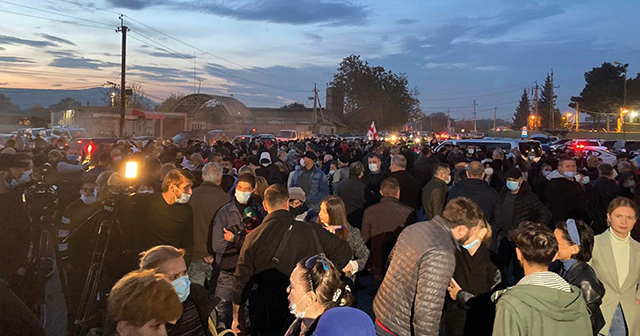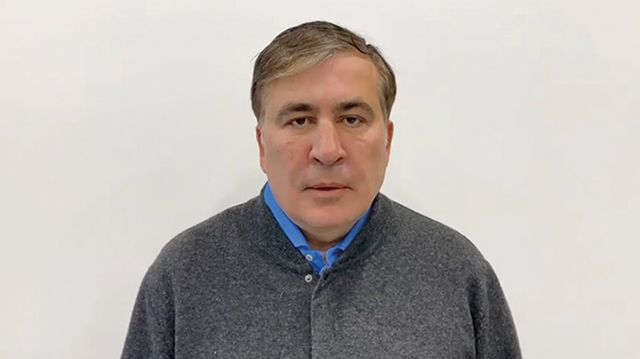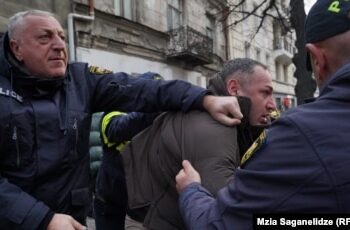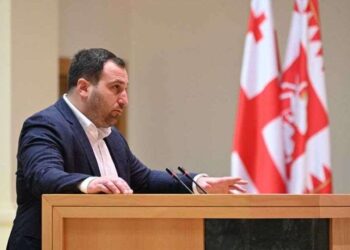It has been a dramatic week for former President Mikheil Saakashvili and his supporters.
On November 9, following 40 days of hunger strike, Saakashvili was transferred from Rustavi Prison to Gldani prison’s N18 Medical Facility. He claimed he was taken there unwillingly and was subject to abuse on the way and on arrival.
“They pulled me out of the car, hit me in the neck several times, and dragged me to the ground by grabbing my hair. I resisted,” reads a letter from Georgia’s third president introduced to the public by his lawyer, Nika Gvaramia.
“I was deceitfully moved here after it was announced to me that I would be taken to a civilian clinic in the city. They canceled a meeting with my doctors, and an appointment with my mother and children. I was taken to a section housing criminals, and abuse was shouted at me.
“Despite my categorical refusal, I was dragged out of the car while under constant harassment. I was dragged to the ground, and was hit several times in the neck. I was dragged by my hair and of course I resisted, just as I did after in the ward, where some vague criminal-looking medical staff approached me. They started injecting something into me without my permission. I had a reaction caused by stress after all the violence and abuse. I refuse all medical intervention. I will not cooperate with medical staff. I will meet only with my personal doctor. The purpose of my transfer here is unequivocally my physical destruction at the behest of Putin!”
He then went on to rally his supporters. “I was obliged to put up physical resistance to the violence, but I was alone in here. You are out there, numerous, and therefore no-one can defeat you in the conditions of peaceful but very strong protest. Don’t be fooled by their provocations. With our unity, we must save our country, which has fallen into the hands of bandits and is on the verge of extinction, with peace. Our country, our families, our homeland have to be saved.”
After Saakashvili was taken to Gldani prison hospital, Justice Minister Rati Bregadze told media that Saakashvili had physically and verbally abused prison staff. Later, the Ministry of Justice issued a statement claiming Saakashvili also damaged expensive medical equipment.
Public Defender Nino Lomjaria visited Mikheil Saakashvili in Gldani Prison Hospital, after which she told reporters that Saakashvili said the Penitentiary Department had lied to him about where he was being taken.
According to the Public Defender, the situation in the institution does not fully comply with the conclusions and recommendations issued by the group of doctors assigned to Saakashvili, while Saakashvili himself opposed his transfer to Gldani Prison.
The United National Movement on November 6 had given the authorities 24 hours to transfer Mikheil Saakashvili to a civilian hospital.
“We are giving the government 24 hours to transfer Mikheil Saakashvili to a civilian hospital. Bidzina Ivanishvili has 24 hours. If anyone has any grain of common sense in power, they should make the right decision and take him to a place where his life and health will be ensured,” party chairman Nika Melia announced at a rally outside Rustavi Prison.
If their demand was not met, they threatened large-scale protests countrywide, and these are now ongoing. Rallies have already been held in Batumi, Zugdidi, Kutaisi, and Rustavi.

Georgia’s foreign friends and partners responded to the transfer of the former president Mikheil Saakashvili to the prison hospital, urging the local authorities to treat him fairly and with dignity, and to transfer him to a civilian hospital for better treatment.
“It is the responsibility of the Government of Georgia, in this case, to protect inmates from abuse, including mental abuse; to provide adequate medical care; and to protect their private health information in accordance with Georgian law,” US State Department spokesperson Ned Price stated at a briefing this week.
“We are closely following, as we have been since it occurred, the imprisonment and now the treatment of former President Saakashvili, including the statement from Georgia’s Public Defender’s Office that raises concerns about the conditions of Mr. Saakashvili’s imprisonment. In light of that statement, we urge the Government of Georgia to immediately take steps to ensure that Mr. Saakashvili’s urgent mental health and medical needs are addressed. We continue to urge the Government of Georgia to treat Mr. Saakashvili fairly and with dignity, in accordance with international standards and Georgian law. It is the responsibility of the Government of Georgia, in this case, to protect inmates from abuse, including mental abuse; to provide adequate medical care; to protect their private health information in accordance with Georgian law,” stated Price.
“The United States continues to follow very closely the imprisonment and health condition of Mr. Saakashvili and we remain concerned for his well-being,” US Ambassador to Georgia Kelly Degnan told reporters.
She called on the government to ensure that Saakashvili is immediately provided with the medical and mental health care he needs, in a fully equipped medical facility.
“In light of the medical teams’ recent assessment that he is at high risk and needs urgent treatment, as well as the Public Defender’s statement that the Gldani prison hospital No 18 is not sufficient, we urge the government to ensure that Mr. Saakashvili is immediately provided with the medical care that he needs in a fully equipped medical facility,” Ambassador Degnan said.
“We also urge Mr. Saakashvili to accept the recommendation of his doctors and accept the medical care that they say he needs. This is obviously a very sensitive and emotional situation. Right now, the focus needs to be on addressing Mr. Saakashvili’s mental health and physical well-being. It’s our strong recommendation to the government to ensure that he is provided with the medical and mental health care that needs. He should be treated fairly and with dignity, in accordance with Georgian law and international standards.
“In any country, the government has a responsibility to protect inmates from abuse, including mental abuse, as well as to ensure their medical well-being and their safety. So, again, we urge the government to ensure that Mr. Saakashvili is immediately provided with the medical and mental health care he needs, in a fully equipped medical facility,” she added.
“The upholding of Saakashvili’s rights and due legal process are key and under the full responsibility of the Georgian authorities,” EU Ambassador to Georgia Carl Hartzell said at a webinar involving Members of the European Parliament.
“Of course, we are also following closely the situation of Georgia’s third president in prison, in cooperation with trusted local partners, among them the Public Defender. From the outset, the EU made clear that the upholding of his rights and due legal process are key and under the full responsibility of the Georgian authorities. These rights include the right to stand trial, transparent, fair and due judicial proceedings and the right to adequate health care, as well as privacy and dignity whilst in prison. The Government of Georgia should make every effort to fully uphold these rights,” the Ambassador said.
Amnesty International responded angrily to the transfer of Mikheil Saakashvili to the Gldani prison hospital on Twitter.
“Ex-President Saakashvili (5th week of hunger strike) violently transferred to prison hospital; allegedly threatened; denied dignity, privacy & adequate healthcare. Not just selective justice but apparent political revenge,” the organization tweeted.
Justice Minister Bregadze published a post on his Facebook page Thursday, stating the European Court of Human Rights had rejected Saakashvili’s complaint regarding his wish to transfer to a private clinic, and had asked him to end his hunger strike.
The Government of Georgia was informed by a letter to the Strasbourg Court of 10 November 2021 that on the same date Mikheil Saakashvili’s representatives had appealed to the European Court of Human Rights to immediately transfer Saakashvili from N18 Medical Facility (where, according to the appellant, his health and safety are not adequately protected) to a multi-profile civilian clinic.
The ECHR did not grant the applicant’s request and, instead of pushing for his transferal to a civilian clinic, urged the applicant party to end the hunger strike.
“The Government of Georgia must provide the European Court of Human Rights with information on the applicant’s health and safety by 24 November 2021,” the post reads
On November 10, the Penitentiary Service announced it would not take Mikheil Saakashvili to his own trial looking into a criminal case under Article 315, Part 1 of the Criminal Code of Georgia. The statement came following the State Security Service’s claims that in order to prevent Mikheil Saakashvili from entering the Gldani clinic, it had been planned by a number of political parties to block the access roads to the facility.
“Such actions may also take place if we escort him to the courtroom. In addition, accused / convicted M. Saakashvili has stopped a substantial part of his treatment, and his transportation and attendance at trial may pose an additional risk to his health.
“In view of the above, the Special Penitentiary Service is deprived of the opportunity to ensure the accused / convicted M. Saakashvili’s attendance in the Tbilisi City Court,” the statement reads.
The trial on the criminal case of the former President of Georgia, Mikheil Saakashvili, began on Wednesday.
By Team GT














